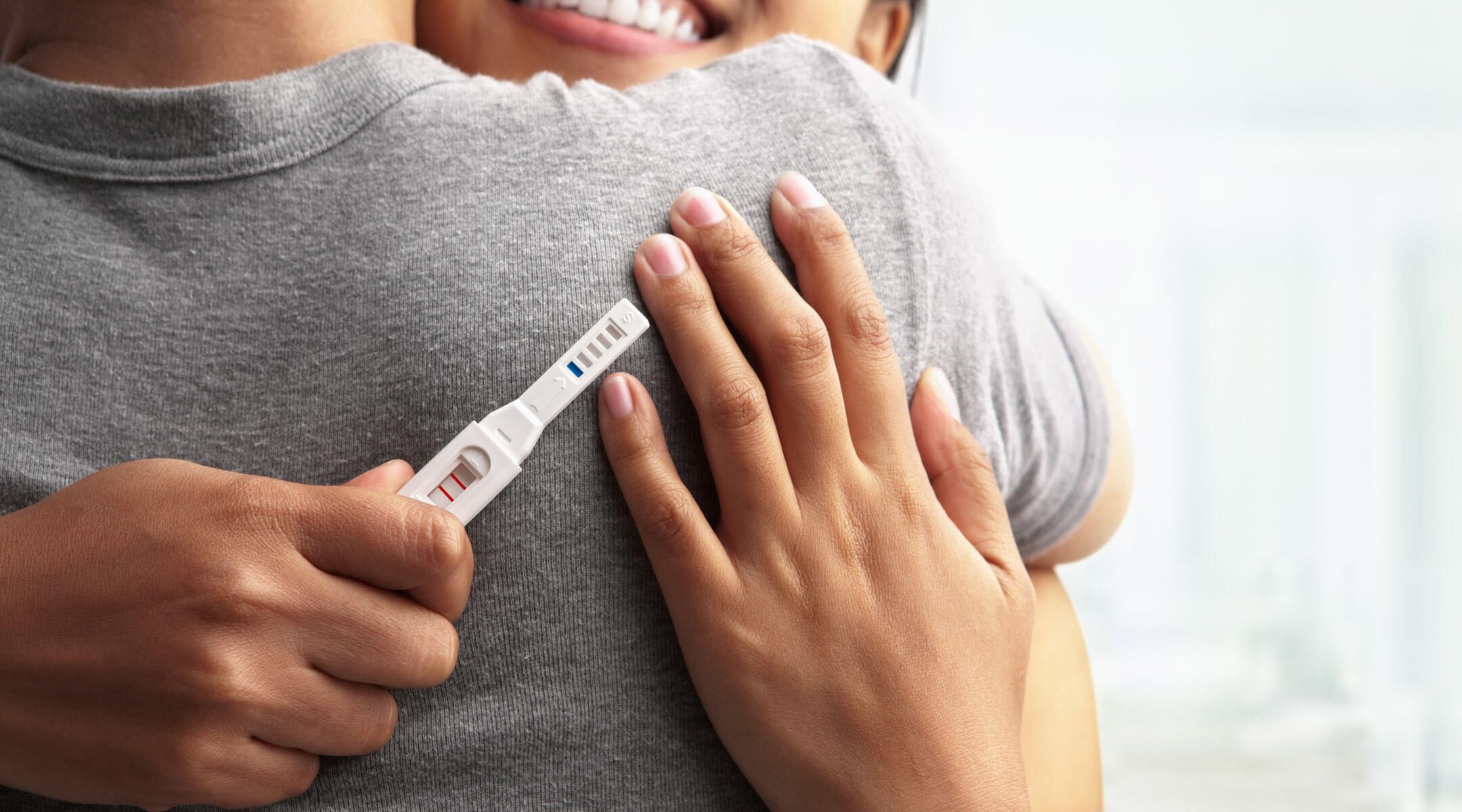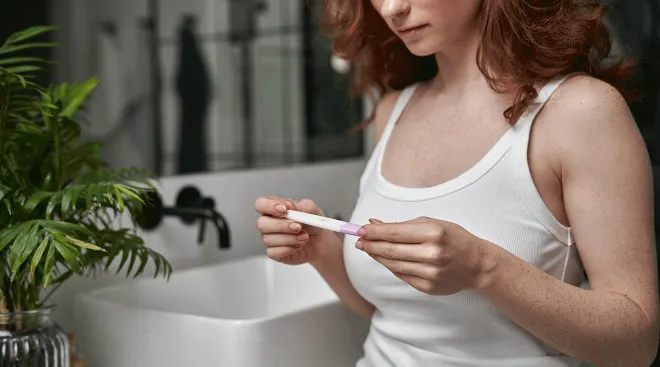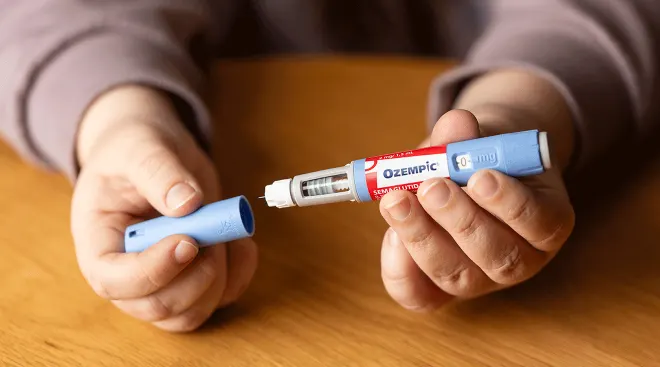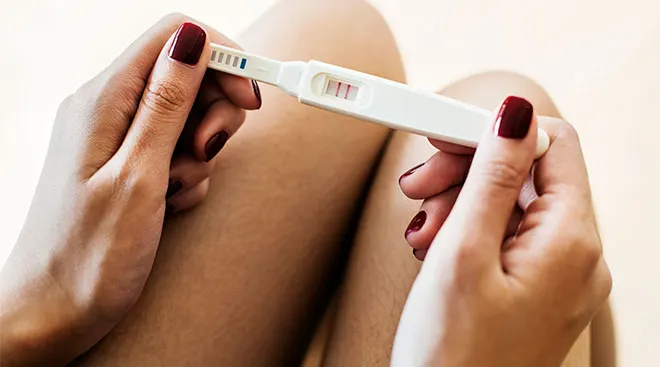How to Recognize Implantation Cramps
If you have cramps, it’s easy to assume your period is to blame. But experiencing cramping before your period is due can actually be a sign you’re pregnant! They’re called implantation cramps, and despite the fact that most women don’t know they exist, they’re actually pretty common. So what is implantation cramping, how soon do you feel it after conception and where exactly is implantation pain located? Read on to learn everything you need to know.
When an egg is fertilized, it happens in your fallopian tubes, explains G. Thomas Ruiz, MD, lead ob-gyn at MemorialCare Orange Coast Medical Center in Fountain Valley, California. The fertilized egg then travels to your uterus, where it’ll burrow into the lining. “This could cause you to experience minor cramping or twinges in the very low, mid-abdomen,” says Julie Lamppa, APRN, a certified nurse midwife at Mayo Clinic. This mild discomfort is also known as implantation cramping.
According to Sherry Ross, MD, an ob-gyn and women’s sexual health expert, while implantation cramps are common, not all women feel them.
Wondering how soon you can feel implantation cramps after conception? Sorry to say there’s no definitive answer. Every woman is different, but Ross notes that they usually occur 6 to 10 days after ovulation. So if you have a 28-day cycle, in which day 1 is the first day of your last period, ovulation would occur between days 14 and 16, Ross explains. With that timeline, implantation cramping should generally occur between days 20 and 26 of your cycle. So if you’re cramping after ovulation and wondering if it’s a sign of pregnancy, it could be. Or you might think that your period is a little early, Ruiz adds.
How long does implantation cramping last?
So how long do implantation cramps last? Again, it varies, but usually you can expect that the cramping will last one to two days before wrapping up, Ruiz says.
Now that you know what they are and when to expect them, you may still be asking yourself: What do implantation cramps feel like? Implantation cramps are similar to period cramps, Ross says. You may experience some discomfort that comes and goes—or you may feel nothing at all.
Implantation cramps vs. period cramps
So how do you know if you’re experiencing implantation cramps or period cramps? It can be hard to distinguish between the two. The difference between implantation and menstrual cramping is—eventually—a positive pregnancy test, Ross says (more on that below). That said, implantation cramps are generally shorter in duration and not as intense, Lamppa adds. “You may not experience cramping at all—or [it may be] so minimal, it’s barely noticeable. This is perfectly fine. It has no bearing on the success of your pregnancy,” she adds.
Ovulation cramps vs. implantation cramps
Similarly, it can be hard to distinguish between ovulation and implantation cramps. Ross suggests using a period tracker during your cycle to help you differentiate. This way you can figure out when you might be menstruating, ovulating or experiencing implantation. “These landmarks of a period cycle can be identified by the time of the month cramping occurs and having a negative or positive pregnancy test,” she explains.
Where do you feel implantation cramps?
If you can’t decide whether you’re experiencing tummy troubles, period pain or implantation cramps, you may be wondering where implantation cramps hurt. You’ll likely feel the cramps throughout your pelvis or more in the middle of your pelvis, Ruiz says, but they shouldn’t be overly intense. You may have some pain in your lower back and abdomen too. You generally won’t feel implantation cramps on one side only. “If you feel moderate to severe cramping or pain, especially if it’s located off to the side versus midline, you need to contact your provider,” Lamppa says. It could be nothing, but it could also be a sign of an early pregnancy loss or an ectopic pregnancy, which is a non-viable pregnancy that’s located outside of the uterus, usually in the fallopian tube, she says
In general, “implantation cramps are usually mild and likely won’t need intervention,” Lamppa says. But if you’re uncomfortable, there are a few things you can do to get relief:
- Take a warm bath or shower. The heat can help relax your uterine muscles and ease implantation cramps a bit, Ruiz says.
- Use a heating pad. Any kind of warm compress on your pelvis can be helpful, Lamppa says. Yes, using a heating pad during pregnancy is safe, since it won’t cause your core temperature to spike. But to be safe, make sure the heating pad is below 100 degrees Fahrenheit, and use it on localized areas for short periods of time (10 to 15 minutes).
- Take an OTC pain reliever. “If you need medication, acetaminophen is likely your safest option, Lamppa says. “It’s recommended to avoid medications such as Ibuprofen or Motrin early in pregnancy.”
Implantation symptoms can also include some bleeding or spotting, which is normal, Ruiz says—but if your cramps are severe or you have really heavy bleeding, call your doctor or go to the emergency room.
In addition to implantation cramps, there are some other subtle early signs of implantation to look for. Some women will experience light bleeding, frequent urination, breast soreness, fatigue, nausea, headaches and mood swings, according to Cleveland Clinic. Of course, decoding these early signs of pregnancy can be tricky since many of them are similar to symptoms you may experience right before your period.
Still, if you’re generally in tune with your body, you may pick up on a few signs of implantation. Keep in mind though that there’s also a good chance you won’t feel anything at all during implantation.
Rather than question every tummy twinge and passing pelvic pain, it’s best to get confirmation with a pregnancy test. Unfortunately, this also means you may have to wait it out a wee bit longer to find out if you’re expecting.
You may be super-eager to pee on that stick (and ASAP), but you’ll want to time that fateful bathroom break just right. So how soon after implantation can you test? According to the American Pregnancy Association, implantation can happen about 6 to 12 days after an egg is fertilized. If you’re pregnant, this is when your body will start producing hCG (human chorionic gonadotropin), the hormone a pregnancy test detects. It can take a few days for your body to produce enough hCG to be detectable via a pregnancy test, so waiting until after your missed period is the best way to limit the risk of a false reading. Can’t hold out? You’ll want to wait at least five days from the onset of those suspicious cramps. Testing early may lead to a false negative result—even if you’re actually pregnant.
Frequently Asked Questions
Can you feel implantation happening?
The process of an embryo burrowing into your uterine lining sounds like something you should be able to feel, so it’s natural to wonder, “What does implantation feel like?” But, according to Ross, aside from cramps and maybe some spotting, you likely won’t feel any other implantation symptoms. Some women may have no indication of implantation at all.
Why am I having cramps a week before my period?
If you’re cramping a week before your period, it could be due to implantation cramps. As Ross explains, in a 28-day cycle, implantation cramps will occur sometime between days 20 and 26, which would fall in the range of a week before your next period.
Why am I cramping one week after my period?
If you’re cramping a week after your period, it’s probably due to ovulation or mid-cycle cramps, Ross says, as ovulation occurs about a week after your menstrual cycle.
I’m having abdominal pain after my period. Could I be pregnant?
Abdominal pain following your period could be due to lots of reasons, including a ruptured cyst, endometriosis, uterine fibroids, appendicitis or intestinal problems, Ross explains, adding, “It’s unlikely that abdominal pain right after a period is a sign of being pregnant.”
I have period pains but no period. Could I be pregnant?
If you have period pain without any bleeding or have missed your period, Ross recommends getting a pregnancy test, as both could be early signs of pregnancy.
Are implantation cramps the same as early pregnancy cramps?
Early pregnancy cramps can happen as a result of hormonal and other changes that affect your uterus and ligaments, which includes implantation. But, while implantation cramps could be the same as early pregnancy cramps, you can also get early pregnancy cramps later on for different reasons.
Are there other reasons I could be cramping aside from implantation?
Cramping can be caused by lots of different things, including your period, ovulation, implantation, pregnancy, digestive issues, a ruptured ovarian cyst, urinary tract infection and endometriosis, Ross notes. “If the cramping is severe or persistent, it’s important to consult a healthcare provider.” Some other indicators to call your provider? Unusual and heavy bleeding, fatigue and dizziness. They’ll do an ultrasound, blood count and hCG test to figure out what may be causing your symptoms.
If you’re actively trying to get pregnant, you may feel encouraged or even excited by some sudden mild pelvic discomfort—and, yes, you might be experiencing implantation cramps. Still, you shouldn’t fret or assume you’re not pregnant if you don’t feel anything at all. It can be confusing and frustrating, but a well-timed pregnancy test can provide clarity (and, hopefully, the confirmation!) you’re looking for.
Please note: The Bump and the materials and information it contains are not intended to, and do not constitute, medical or other health advice or diagnosis and should not be used as such. You should always consult with a qualified physician or health professional about your specific circumstances.
Plus, more from The Bump
Julie Lamppa, APRN, is a certified nurse midwife at Mayo Clinic. She also serves as a clinical instructor in the Department of Obstetrics and Gynecology at the Mayo Clinic College of Medicine and Science.
Sherry Ross, MD, is an ob-gyn, women’s sexual health expert and author of She-ology: The Definitive Guide to Women’s Intimate Health. Period. and She-ology, The She-quel: Let’s Continue the Conversation. She earned her medical degree from New York Medical College.
G. Thomas Ruiz, MD, serves as lead ob-gyn at MemorialCare Orange Coast Medical Center in Fountain Valley, California. He received his medical degree from UC Irvine School of Medicine in California.
Cleveland Clinic, Am I Pregnant
American Pregnancy Association, What Is Implantation Bleeding?
Learn how we ensure the accuracy of our content through our editorial and medical review process.
Navigate forward to interact with the calendar and select a date. Press the question mark key to get the keyboard shortcuts for changing dates.



















































